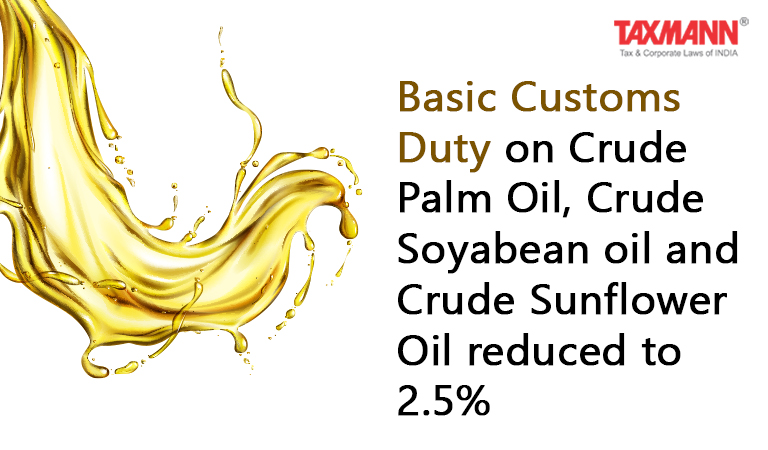Basic Customs Duty on Crude Palm Oil, Crude Soyabean oil and Crude Sunflower Oil reduced to 2.5%
- Blog|News|GST & Customs|
- < 1 minute
- By Taxmann
- |
- Last Updated on 14 September, 2021

Notification No. 42/2021-Customs Dated 10th September, 2021
The domestic prices of edible oils have been ruling high during 2021-22 which is a cause of serious concern from inflation as well as consumer’s point of view. The import duty on edible oils is one of the important factors that impacted landed cost of edible oils and thereby domestic prices.
In order to ensure the availability of edible oil to consumers at fair prices, Government of India, has reduced the customs duty on Crude Palm Oil, Crude Soyabean oil and Crude Sunflower Oil to 2.5%. Also, the customs duty on Refined Palm Oil, Refined Soyabean oil and Refined Sunflower Oil is reduced to 32.5%.
Click Here to Read the Full Circular
Disclaimer: The content/information published on the website is only for general information of the user and shall not be construed as legal advice. While the Taxmann has exercised reasonable efforts to ensure the veracity of information/content published, Taxmann shall be under no liability in any manner whatsoever for incorrect information, if any.

Taxmann Publications has a dedicated in-house Research & Editorial Team. This team consists of a team of Chartered Accountants, Company Secretaries, and Lawyers. This team works under the guidance and supervision of editor-in-chief Mr Rakesh Bhargava.
The Research and Editorial Team is responsible for developing reliable and accurate content for the readers. The team follows the six-sigma approach to achieve the benchmark of zero error in its publications and research platforms. The team ensures that the following publication guidelines are thoroughly followed while developing the content:
- The statutory material is obtained only from the authorized and reliable sources
- All the latest developments in the judicial and legislative fields are covered
- Prepare the analytical write-ups on current, controversial, and important issues to help the readers to understand the concept and its implications
- Every content published by Taxmann is complete, accurate and lucid
- All evidence-based statements are supported with proper reference to Section, Circular No., Notification No. or citations
- The golden rules of grammar, style and consistency are thoroughly followed
- Font and size that’s easy to read and remain consistent across all imprint and digital publications are applied



 CA | CS | CMA
CA | CS | CMA
